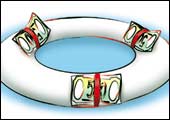|
Face
it. The last decade has seen three economic aspects of your life
change beyond all recognition: earning, spending and investing.
The Indian economy has become more dynamic, and you, as a consumer,
have been the biggest beneficiary. But you have to pay the price
in terms of uncertainty on other variables.
Back in the good old days, earning, spending
and investing were very clearly defined. Get into a PSU or any big
private company, and you had it made for life. Jobs were 'till retirement
do us apart'. The salary was low, but so was the cost of a ho-hum
life. You could settle down to a comfortable routine, and look forward
to the customary wristwatch you'd get on retirement; and remember,
an HMT watch was a prized possession that mps had the privilege
of allotting out of turn. And you could even draw a pension, in
most cases, to back up your lifelong savings in LIC, PPF, UTI schemes
and fixed deposits. Equities? What's that?
 Nostalgia
Warning Nostalgia
Warning
How quaint those days seem now, don't they?
Something from a dusty old novel, with the protagonist riddled with
varied forms of angst that had nothing to do with money. Alas, we've
outgrown that. These days, nobody has the luxury of not thinking
about money. Make that worrying about money. Job insecurity, credit
card bills, a flagging stock market, sinking interest rates (on
everything except credit card outstandings) and what have you, it
almost makes you nostalgic for those sleepy days of ho-hum existence.
Notalgia, be warned, is best left to novelists
(and even they, unless they sell a million copies, can't hope to
live off their royalties). What does a realist like you do? Get
cracking, what else. And this begins with the appreciation of something
the old system never provided: choice.
 Survival
Kit Survival
Kit
Exercise your choices consciously. On spending,
never let lifestyle bills exceed 15 per cent of your income. The
money is better spent investing in yourself-in your own earning
capacity. Keep upgrading your skills, and keep the old boys network
well oiled. Remember, even good businesses go bust, and joblessness
is no longer something that afflicts wrongdoers. So, beyond your
own retirement savings, keep a reserve to last you at least six
months jobless.
The contingency reserve is best kept liquid.
Your long-term investment portfolio requires the assessment of a
much wider set of choices. Equity? Debt? Gold? Mutual funds? A diversified
combination? Be clear about the risks involved, and your own risk-bearing
capacity, before you allocate your funds. And even after that, it's
best to keep reviewing the choice of investments. Mutual fund performance
keeps changing, especially these days. Debt-based funds have seen
a reversal of fortunes, of late, now that interest rates are bottoming
out.
Not only that, broad economic conditions keep
shifting as well. It's advisable to keep yourself engaged with all
investment related goings-on, and to keep an ear out for what the
managers of your MFs are saying. Fund managers realise that they
need to keep retail credibility, and must vie for your opinion.
 More
Choices More
Choices
Luckily, investment choices are still expanding.
Recent moves have enabled resident Indians to keep a fraction of
their money in dollars or euros. Real estate is an investment zone
that has also become active, of late.
Home loans are more sensible now than they
used to be. Rates are down sharply, and if you can restructure your
old high-cost loan so that you pay less, nothing like it. There
are also floating rate loans available. Keep yourself armed with
your options.
Times may be much harder than you remember.
But then, the very prospect of choice should reassure you that it
needn't be harder on you, financially, if you think harder about
your options.
|

